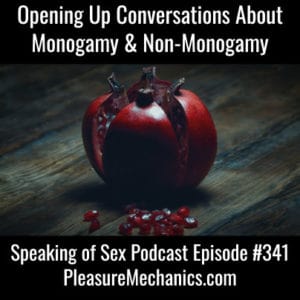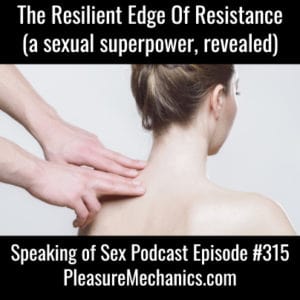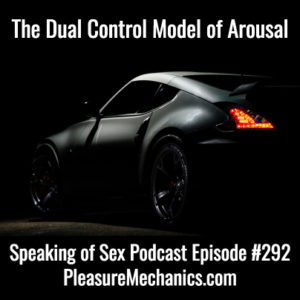Podcast: Play in new window | Download

Have you ever talked about the boundaries of your relationship? What does monogamy mean to you? What commitments do you need in a relationship to feel safe and supported?
Here’s how to open up the vital conversations about monogamy, relationship boundaries and commitment. We guide you in engaging in thought experiments about non-monogamy as a safe way to explore the contours of your desires, boundaries and needs.
Be sure to listen to the episode on Explicit Monogamy Agreements and grab the interactive worksheet here.
Podcast Transcript for Episode 341
Podcast transcripts are generated with love by humans, and thus may not be 100% accurate. Time stamps are included so you can cross reference or jump to any point in the podcast episode above. THANKS to the members of our Pleasure Pod for helping make transcripts and the rest of our free offerings happen! If you love what we offer, find ways to show your love and dive deeper with us here: SHOW SOME LOVE
Chris Rose: 00:00 Hi, welcome back to Speaking of Sex with The Pleasure Mechanics. I’m Chris.
Charlotte Rose: 00:05 I’m Charlotte.
Chris Rose: 00:06 We are The Pleasure Mechanics and on this podcast we give honest, explicit and soulful advice about every facet of human sexuality. Come on over to pleasuremechanics.com, where you will find our complete podcast archive just waiting your listening enjoyment. Over 300 episodes are conveniently sorted for you in our sex index by topic, so you can immediately find the episodes you most crave. Welcome back. We are just home from a two week break. It has been a whirlwind of a month. Our daughter finished her first year of school. Meanwhile, I was in Philadelphia for the AASECT conference, the largest gathering of sexuality professionals, where I got to meet so many fabulous people and learn a ton with a great crowd and we will be bringing some of those voices to you on future episodes.
Chris Rose: 01:07 Then immediately after the conference I drove my rental car home and we loaded up our family vehicle and drove to Canada, where I have a tiny family cottage that has been in my family for five generations and it is an off-the-grid, rural slice of heaven. So we go up there every year as a family to unwind and unplug and get off the grid and really just soak in some deep relaxation and family time. And it was glorious.
Charlotte Rose: 01:42 There’s a lake, we didn’t mention the lake, so we just swim nonstop. It’s glorious. It’s my favorite place to be.
Chris Rose: 01:49 It’s in one of those regions of Canada that’s just full of glacial spring-fed Lakes. So the water is cold and clear and clean and there are loons at night and dragon flies and mosquitoes during the day. It’s not really heaven because there are still mosquitoes, but it is an amazing opportunity for us to really unplug and we did just that, and so we were gone for a couple of weeks. We are back. Happy summer. We hope you guys are doing well and we want to launch in today’s episode about non-monogamy thought experiments, about the conversations you can have either alone or with your friends or with your romantic partners, about what monogamy and exclusivity mean to you, what you value about them and why and how this might inform your relationship.
Chris Rose: 02:48 Part of this was informed … So as I was packing for the AASECT conference and packing my Pleasure Mechanics uniform and some sex toys for a conversation I was going to have with a partner, I kind of turned to Charlotte and I was like, “So, I know we haven’t talked about it in a long time, but if the opportunity arises and I get to play with someone, can I?” And we were, you know, packing for our family trip and dealing with our daughter’s end of school. And we were kind of like in this conversation all of a sudden. But it’s a conversation we have been in since the beginning of our relationship and it’s a conversation we have a lot of experience with, and so we want to open this conversation up with you all and encourage you to at least start thinking about the boundaries of your relationship. Why those boundaries are there, what they offer you, what they do for you, and if those boundaries are flexible or not.
Charlotte Rose: 03:47 My answer was yes, by the way. If it is enlivening and it’s not going to impact your connection to our family, then go for it.
Chris Rose: 03:57 That was really generous of you. I, of course, had no time or energy to think about such pleasures, but it was also fascinating to be in this crowd of sexuality professionals with so many queers and kinky folks and also just brilliant, intelligent minds, which is my biggest turn on. It was amazing to feel the permission to at least give myself the tantalizing taste of possibility. To pack my bags to go off on this solo trip, that was really a work trip. But to go off into the world alone for a couple of days, knowing I had erotic agency and also knowing that you trusted me, that you knew and you trusted any decision I make would be kind of filtered through the lens of my commitment to our family.
Chris Rose: 04:47 And so what are these conversations look like? Because for most of us, monogamy is an assumption and it’s the worst kind of assumption. It’s an implicit unspoken assumption in our culture. We get together in couples and all of a sudden if you have this idea of that you’re exclusive or monogamous or going steady or taking things seriously, and certainly once you’re engaged or married, we bring to that relationship a whole universe of assumptions and unspoken rules that we expect our partner to follow. But we get into trouble because it’s so unspoken, you might have a different set of rules assumed than your partner does. So these blurry lines of monogamy cause a lot of heartache and a lot of pain and also a lot of constriction and shutdown of potential in your life.
Chris Rose: 05:43 We did a great episode about this called explicit monogamy agreements where we really walk you through having an explicit spoken agreement that is present in an ongoing conversation together about the boundaries of your relationship. I will link to that in the show notes page and there is also a worksheet where we can guide you through that process in an interactive way. But the first part of this, and where I want to focus today, is on the thought experiment of non-monogamy. I love thought experiments. For me, thought experiments are all about using the power of the human mind to pregame, to pre-visualize potentials and possibilities for yourself and feel into how you feel about them. Notice your responses. Doing this can save us a whole lot of stress, heartache, and potentially loss of love in our lives because we can think through things ahead of time and we often don’t do this when it comes to our romantic relationships, our sex lives. It’s like the best use of fantasy for me. So what are your assumptions about monogamy?
Charlotte Rose: 07:02 This is such a huge question and everyone’s going to have a slightly different answer and you may never have fully examined what you assume monogamy means to you and your partner. For some people that will include or not include porn or flirting with strangers or sharing deep emotional things with exes or …
Chris Rose: 07:25 Or even friends. When we were looking at people’s definitions of monogamy, so often it came up the exclusive sharing of sexual and emotional connection with one person, and we need to examine this, right? What does sexual connection mean? As Charlotte said, is that flirting or with your barista? Is that sexual connection? Is that cheating? But the one that really trips me up is emotional connection because it is impossible to have emotional connection with one person. What a sad, limited life that would be, and also that’s just not how humans are built. We have human connections with …
Charlotte Rose: 08:04 The checkout person when you share a laugh, when you’re getting your groceries, like human connection, excuse me, emotional connection is everywhere. [crosstalk 00:08:14] is human. It’s everywhere. And to to stop having that with every human aside from your partner is seriously troubling.
Chris Rose: 08:22 For most people, we don’t worry about people’s like close friends from college or maybe their coworker friends and especially if you’re heterosexual, there’s this assumption that same sex friends are not as threatening, right? Like you can have all the emotional intimacy you want with your girlfriends, but if you get really close with one of your male coworkers, I’m going to flair because all of a sudden my position of exclusivity in your life is threatened. So we need to examine this. What do you mean when you say you’re in a monogamous relationship? What are the boundaries of that and what are the values you bring to that? Why are you in a monogamous relationship? What does that mean to you? What does it provide for you? What does it allow you to let go of?
Chris Rose: 09:12 For a lot of people, the idea of being in a devoted relationship creates a sense of security. It’s a sense of commitment. I have your back and you have mine. We are doing this life thing together for a lot of people that is then extended into the trust that because you are devoted to me, you will not give your energy or resources to others. You will not go too far with other people emotionally. You will not call other people before you call me. There’s this sense of being someone’s number one and only. Again, we need to examine that. We are not here to espouse non-monogamy or monogamy. We are in a 99.99% devoted exclusive relationship with one another. Charlotte and I, and we have been for 13 years but this has been flexible. We have experimented. We have opened up and then closed back down again. We have explored opening up our relationship to a third partner and opened our hearts and fell a little bit in love with someone together and then came up across the truth of what love and family meant for us wasn’t what it meant for this third person and we needed to close back down.
Chris Rose: 10:37 We have experimented with physical intimacy with other people in different ways over time, but always have come back to this, you and me, we’re doing life together. We’re building our life, we’re making our decisions together, we’ll building a family together.
Charlotte Rose: 10:52 For us, the family piece was really central and we felt like for how we wanted to parent, we wanted to keep our relationship closed during these early years of really tending to our child together. We’ve always been very clear that as things change, as she ages, perhaps we will open back up again as we have more energy and our child needs us less in a certain kind of time focused way. Also seasons are so important in relationships and being clear about when you’re shifting from one season to the next and having open communication with your partner and being honest with yourself is so important.
Chris Rose: 11:34 So we see in this how different values can emerge in these conversations. When Charlotte and I over the years started talking about … Because when we got together, so just to set the context, I was in a poly-kinky community in San Francisco, going to sex parties every other night and I had a kind of pod of lovers who were very important to me, and then Charlotte and I met. We fell in love. You had had more of a monogamous background.
Charlotte Rose: 12:00 Yeah.
Chris Rose: 12:01 With cheating.
Charlotte Rose: 12:02 Yes. I had not fully figured out how to use my sexual energy and I was a cheater.
Chris Rose: 12:08 I want to mention that because cheating is a form of non-monogamy we don’t name as non-monogamy. You can have a monogamy agreement and habitually break it and even enjoy breaking it for the thrill of breaking it, seeing what you can get away with until you get caught and that’s how a lot of people play this card. What is another option of being more transparent and open and honest and having these conversations even if you choose to stay monogamous. That’s what I really want to emphasize here is these conversations, these thought experiments aren’t just in preparation to open up. They are in … they’re essential for every relationship to get clear about how you are committed to each other, what your devotion means, what are your expectations, and so going back to the values piece, in my conversations with Charlotte, our primary value there was kind of family and keeping our life less chaotic.
Chris Rose: 13:09 I know from my experience when I have sex with people, I form emotional connections. I fall in love with people I touch and I know about myself that if I open myself up to sexual relationships, that is also opening myself up to emotional relationships. Right now, I want to focus my emotional energy on Charlotte, on our child, on this business, on myself, and my own physical healing I’m doing right now. But that doesn’t mean emotional exclusivity, right? I kind of have the intention of focus and devotion, but we have been able to do that while staying emotionally available and open and falling in love with new people in our community because we have this really explicit agreement that then doesn’t feel as scary, right? We can build relationships, we can explore that sense of attraction and desire and longing that can come up for people without it being threatening.
Charlotte Rose: 14:18 That’s a light falling in love, not like a super intense love falling in love, but more like a friend, I am so excited and interested in who you are. I want to spend time with you, like let’s connect. Just little falling in love. It’s a different set of things to address though on the same spectrum.
Chris Rose: 14:39 Right. So in these conversations about especially emotional intimacy, because sexual intimacy seems a little bit more cut and dry. Don’t kiss other people, don’t have your genitals stroked by other people and don’t penetrate other people. Those are rules that we can kind of be like, “Okay, that makes sense to me”. What does emotional intimacy look and feel like and where is your boundary? Because we all need boundaries. This isn’t about being boundary less-ness and just trusting your partner and being like, “Great, do whatever the fuck you want”. We all have to find our boundaries of what feels good and what starts to make me feel less safe, threatened, less stable.
Chris Rose: 15:20 A lot of this in the end comes back to time and attention and we’ve said this before, I’ll say it again. For us, love is so much the paying of attention, the focus of attention on one another and if you are in a relationship and you are starting to open it up and every time you look at the part your partner, they’re on their dating apps or answering texts with other people and they are not present with you anymore, that might start feeling really shitty.
Chris Rose: 15:51 If you are on a date and that’s like one breach of a monogamy boundary, right? If you’re on a date and you’re trying to focus your attention on one another and your partner’s just looking around the room and checking out all the hot bodies and commenting on everyone else’s hotness, you might hit a place where you’re like, “I want your eyes back on me. I want your attention back on me”, and we need to be able to find these boundaries, experience them in your body like, “Ooh, this isn’t feeling good anymore”. And then articulate, say out loud what you need to have that relationship feel secure again.
Chris Rose: 16:28 People are going to be so different in this realm and this is why conversations are so important to have, especially when it comes into fields like online porn, online chat, paying for custom porn, like there’s a brave new world of sexual exploration out there and you need to kind of make it clear. Are we doing this together? Do you have licensed to do it alone? Are we not doing it at all? Do we agree on these values? In these conversations, are your values aligning or is one of you like, “I don’t want you talking to other people. I don’t want you texting other people”, and you’re like, “But I love texting all my friends”. That might be a flag for you that you have some real excavation to do of do your values align in your relationship or what is one person’s fear or anxiety that is being triggered by these conversations? If you can address that other conversations become possible, right? Like if you can look at each other in the eye and say, “You are my priority, I want you to feel like my priority and if you ever don’t feel like my priority anymore, you let me know and we will recalibrate back. That is my commitment to you”. Right? What are your commitments to one another and are you on the same page there?
Charlotte Rose: 17:49 There’s a way having these open conversations can actually make you feel much, much safer because you can really be clear about what is true for both of you at this moment in time and where are you both and what is your commitment? That kind of clarifying conversation can be really enlivening because you’re truth telling and you’re making space for what you need and what you want and you’re agreeing to work together with what is. It can be just really exciting, instead of this sort of wandering and what are they doing and what are they really feeling? Are they feeling bored? Are they feeling like they want someone else when they’re out and about without me? I feel like anytime we’re really honest in relationship, it feels good. Even if it’s hard and uncomfortable, there’s still a really deep sense of satisfaction, I think, when we are telling the truth with each other.
Chris Rose: 18:45 So we need to consider the wide range of ways we can be in relationships with one another, ways we can be devoted and committed to one another. I personally would like to move away from the language of monogamy and non-monogamy because these are not two neat buckets we fit into. We all choose how we share physical intimacy, emotional intimacy, spiritual intimacy, intellectual connection with other people and how much space our primary relationship or our family relationships want to take up in our lives in different seasons.
Chris Rose: 19:25 With that permission to kind of do it your way in the way that makes sense for your life right now, we all have a lot of opportunity to get really clear about what we need and want from each other. We can consider possibilities like having occasional threesomes, so bringing in an occasional guest star into a relationship to heat it up a little bit. To add some newness, add some excitement. For some people that is a non-monogamous adaptation with a very monogamous core of a relationship. Other people go into polyamory, meaning loving multiple people, having multiple relationships at the same time and there are, again, countless ways of doing this and there’s a whole lexicon of vocabulary to describe all these different types of relationships.
Chris Rose: 20:21 Other people go into more like sexual exploration with an emotional exclusivity, so they’ll go together to sex parties or swingers events and have sexual excitation with other people. Maybe even share touch, maybe even have penetration with other people but then go home together and don’t continue those relationships. There is also the option of hiring sex workers and this is not something we are going to recommend or not recommend. Just again putting on the table as a possibility. Sex workers are professionals who can offer you specific sexual experiences and the transaction of money makes it really clear. You get a two hour experience and we do not have a relationship beyond that, in less than that has been negotiated too. For some people, if, say, you’re a bisexual in a relationship and every once in awhile you want a specific sexual experience that your partner can’t or won’t provide for you. It’s not even about being bisexual. That’s just an example.
Chris Rose: 21:29 We all have specific sexual experiences that our partner can’t or won’t provide for us. Queerness, fetishes, just very specific longings. Sex workers can be great for this. I recently … As I was packing for AASECT, I tapped into this truth for myself, like “I need a good flogging sometime soon”. Just like a really good powered out flogging just to kind of move some tension from my body, and Charlotte’s probably not the best person to give me that flogging.
Charlotte Rose: 21:59 I don’t have a lot of skills in that department. I have other skills. That one is not one I’m really proficient at.
Chris Rose: 22:05 Right, and if I’m looking at something of like stretching my limits, take me on this kind of endurance journey, I don’t want my sweet, caring wife to be the one to escort me on that journey. So for this, I might hire a pro dom who’s great at flogging and can push my boundaries with real safety and contain that relationship within that transaction so I don’t have to get on FetLife, start flirting with people, start sharing who I am, start building trust and intimacy with other people. I can skip that process by hiring someone. That doesn’t make it less intimate or less human or make that experience we’re sharing less real. It’s just very clearly defined. It has boundaries and this is the power of boundaries.
Chris Rose: 22:53 We often think of boundaries as something to keep away the things we don’t want, a fence to keep intruders out. But what boundaries also do is they contain a space. They create a zone where you know what is possible and you know what will and will not happen, and within that realm we can play more freely. This is the role of rules in sports. If you know what happens when you step on the soccer field, you can play as hard as you want because you know what will and will not happen. Everyone agrees to that and you go and you play the game. If we think of relationships as these living, breathing entities that need boundaries in order to thrive, we better get more deliberate about talking about what those boundaries are. What do you need for your relationship to be as vital and loving and supportive of you as possible? What do you need from yourself? What do you need from your partner? What do you need to stay out, what do you need to stay in and you can have this as an ongoing conversation. This happens over time and it will change.
Chris Rose: 24:07 I remember making some like kind of joke about another sexual partner at some point. We were just on a walk but we had like a year old baby and you were like, “Can you just not go there right now?” I said, “Honey, it’s just a joke. We joke about this all the time”, and you were like, “I am just so not in that zone. I have vomit and milk all over my shirt, like just love me here now”. I got that and we tabled the conversation for like a year and a half.
Charlotte Rose: 24:37 This new conversation about flogging, for instance. We have been exploring that in conversation and as a thought experiment because that is a departure from what we have been doing …
Chris Rose: 24:47 Right. For many months. It’s not one conversation.
Charlotte Rose: 24:50 Right. It’s several conversations of like, “How does that feel? What would feel okay? What wouldn’t feel okay?” Just really exploring it.
Chris Rose: 24:58 “Would you want to be there?”
Charlotte Rose: 24:59 “Would you not?” Yeah, it’s, it’s just really, really seeing where the boundaries are in conversation and in thought. It’s so helpful because some other things you’ve suggested, I’m like, “No, that feels terrible. I don’t know what to do that at all”. This one I was like, “I can see that, like that makes sense right now in our life”, without having an emotional connection, just a physical non-genital release. That makes sense.
Chris Rose: 25:24 I want to emphasize this power of the thought experiment. When you think about something in detail, when you take your brain into thinking about something, visualizing it, experiencing it as fully as possible in your brain, your brain doesn’t really know the difference between that and lived experience. This is one of the greatest tricks of the human brain I think I’ve ever discovered and what it allows for us is if we think through an experience, so say going to a sex club with your partner. Start thinking through that experience in detail as if it were real. What would you wear? Would you go to dinner first? What kind of sex club are you going to? Is it a special event or is it a general sex club? What do you do when you get there? Are you holding your partner’s hands? Do you stay together the whole time? What happens if he wanders off to go to the bathroom and doesn’t come back to you for 20 minutes? Do you start to worry?
Chris Rose: 26:28 Thinking it through as a fantasy, you will start feeling feelings in your body. If you have been working with us on the powers of interoception, of feeling that internal landscape of mindful sex, if you’re part of the mindful sex course, and have been playing with this with us, as you feel your feelings, you can start discerning your emotions and you get to that point in your fantasy and it’s all a yes up to that. You’re feeling good, you’re feeling excited, and then you get to that point where he wanders off for 15 minutes and doesn’t come back and you realize you’re panicking in your fantasy. You’re like, “Well, that doesn’t feel good. I’m starting to feel nervous. What if he’s found someone to play with that’s not me? What if something’s happened to him?” Right? You notice your fears come up in your thought experiment and then you can game them out. You can talk about them. “So if we go to the sex club, we’ve got to stay together and if one of us has to go to the bathroom, the other will be waiting right outside the bathroom for when you come back. At least for our first time, it would make me feel so much better if we really stuck together. Can you agree to that?” “Yeah, honey, that sounds awesome”.
Charlotte Rose: 27:36 Because these things can feel so much safer to do together at the beginning. You’re having an experience together. You’re seeing the same things. You’re hearing the same things. You can talk about them all afterwards.
Chris Rose: 27:45 Yeah, but that’s all not the point.
Charlotte Rose: 27:46 No, I know.
Chris Rose: 27:47 The point here is it’s so much easier to deal with that anxiety and fear in your thought experiment when you’re in your pajamas at home on your couch and realize that will be an issue for me. So let’s talk about it ahead of time. Then it is in the middle of your first experience. You think you’re having a great time. You find him half an hour later just chatting in the snack room, but you’re already freaked out and activated and want to go home. It derailed your experience. So going deep into the thought experiment of your relationship boundaries will give you so much information to then share with one another and even just information about yourself, you will realize who you are as an erotic being is very specific.
Chris Rose: 28:33 You might not care at all if your partner gives massages and cuddles with friends from college who they’ve been doing that for 20 years, but you might get really upset if he calls a friend in a crisis before he calls you, right? All of these things are very personal to who we are and who we are right now. To give yourself permission to be like, this is what I want a need. And then on those edges of comfort where your comfort’s a little bit gray and you’re a little bit hesitant or maybe those places where it feels really scary but exciting and thrilling as well, so scary, but in a way that opens you up. These are the places you can find growth, where you can find positive change, where you can find avenues to expand your capacity together.
Chris Rose: 29:24 Because the danger of unspoken monogamy, the danger of implicit boundaries are that they become an invisible cage and they cut off emotional connections, social connections, intellectual connections that are important to you in your life. We start doubting our attraction and questioning our desire rather than trusting it. And when your head turns and you see someone at a work event that feels really thrilling to you and your whole body wants to go talk to them, maybe we need to trust that and also trust our committed erotic agreement. For me, some of the most exciting, thrilling connection is the erotic connection without the sexual component. We’ll talk more about this on future episodes, but what happens when you allow yourself deep erotic connection with other humans without the distractions of sharing a sexual connection. There’s something there to explore.
Chris Rose: 30:31 All right, so we hope that this conversation has at least given you permission to think about the boundaries of your relationships, spoken and unspoken, to start carving out the rules and boundaries and requests that will make you feel more enlivened in your relationship and start getting rid of the boundaries that maybe don’t serve you. Start finding avenues of exploration together, so you don’t feel like exclusive devotion to one person is a cage, but rather the greatest choice you’re making in this moment. We love the word devotion for this. We don’t own one another. We don’t owe one another. Our relationship, we choose it. We choose it every day and we renew that choice even when it’s hard. That for me is thrilling. What a thrilling gift to receive someone else’s erotic devotion. Someone I love, someone I want to devote myself to.
Chris Rose: 31:29 That feels so much more bold and supportive than, you know, being locked in a monogamy cage because we’re married and that’s what it means to be married. It doesn’t mean anything anymore to be married really. It’s just a legal contract. Now more than ever, you have the permission and choice and cultural support. And again, let us remember that 50 years ago we did not have these choices. We did not have the cultural bandwidth to be in a non-monogamous marriage or to be in a polyamorous relationship or to be a swinger. These things were not permissible. They’re permissible now and there’s cultures to support you, there’s experts to support you. There’s entire communities organized around these choices. Now more than ever you get to do you. But the first part of that is exploring what that even means, what it looks like for you. What are your specific values around this question and what kind of relationship do you most want at this point in your life? And choosing that boldly. Yes, yes.
Charlotte Rose: 32:42 And just for the people who are thinking that this all sounds scary. It’s true that some of it can feel scary because it’s a little bit destabilizing to this idea that monogamy and that this like relationship will stay this way with these boundaries forever and ever. Of course, we like that idea, that feeling of stability, but the truth is that in our lives, attraction can happen, feelings can emerge and that can derail us and our relationship and take us by surprise. There’s something powerful about having these conversations ahead of time and giving ourselves possibilities to feel the full breadth of what it is to be human, to be desired, to long for others, to be excited and to feel a lot. There’s something powerful about choosing our relationships actively.
Chris Rose: 33:46 I’m reminded of the last thing we always say to each other in these conversations. After we open up a conversation about how our relationship is doing, “Are you feeling desire for anything else? Is the still working for you?” Because this is a conversation we’ll circle back to every six months or so. Like, “We still good? How are you feeling? Are you feeling tended to, what do we need? How do we make this better?” When we end these conversations of like, “Cool, so we’re going to kind of stay devoted. We’re not really feeling any changes are necessary. Let me know if that changes.” We all kind of always end these conversations with, “And if you feel anything new, please tell me”.
Chris Rose: 34:30 Having that open ended invitation of like, “If you’re feeling things that we need to talk about, please come to me”, is perhaps one of the most important relationship structures to have in place. An open invitation for conversation. If you’re feeling really attracted to someone at work, I love to hear about it and I want to hear about it as it’s developing, not when it’s at stage 108. If you’re feeling discontent and bored, I would love to know about that and maybe there’s some things we could change. If you’re feeling ignored, please tell me. This open ear is really important for me. Maybe it’s not for you. I don’t know. I don’t want to say anything’s important for everyone. For us it’s been really important because it’s allowed us to change and grow for 13 years. It’s allowed us to experiment and make mistakes and then be resilient and still have this foundation of devotion under us.
Chris Rose: 35:41 It also allows for me allowing myself to have thoughts. At the conference I met a pro dom, so we had had this whole conversation about flogging and then I was having a conversation and all of a sudden I was talking to someone who was a pro dom and offering me a flogging for a certain price. I was like, “Holy shit, how did this happen?” I checked in in that moment. I knew I had permission from Charlotte, so it wasn’t this taboo thing and I checked in. I was like, “Yeah, no thanks. I’m cool”. But having that permission made it not something scary for me to think about and for something to explore and we need to do everything we can so sexuality is less scary to explore. If you want to have a thriving sex life with each other, open conversation is the foundation.
Chris Rose: 36:33 Whatever you think your devotion style is, whether or not you’re ever interested in opening up your relationship, whether or not you’re ever interested in going to a sex party, have these conversations about boundaries, expectations and assumptions. It will only serve you. We would love to know your thoughts about this episode or anything else you’re thinking about in the realm of sexuality. Check out the show notes page of this episode for links to the monogamy agreement episode and for the option of downloading our worksheets so we can guide you through this conversation. If you love this show and want to support our work, please become a supporting member at patreon.com/pleasure mechanics. That’s P-A-T-R-E-O-N. patreon.com/pleasure mechanics. The link is in the show notes page and your sustaining donation helps us do this work in this world and spread the love, share awesome sex-positive resources, and make this world a more pleasurable place.
Chris Rose: 37:36 Join us in that mission at patreon.com/pleasure mechanics. Also to remind you all of our podcasts archives are at pleasuremechanics.com where you will also find our online courses when you are ready to up level your erotic skills. Come on over to our forever home, pleasuremechanics.com. I’m Chris.
Charlotte Rose: 37:58 I’m Charlotte.
Chris Rose: 37:59 We are The Pleasure Mechanics …
Charlotte Rose: 38:01 Wishing you a lifetime of pleasure.











